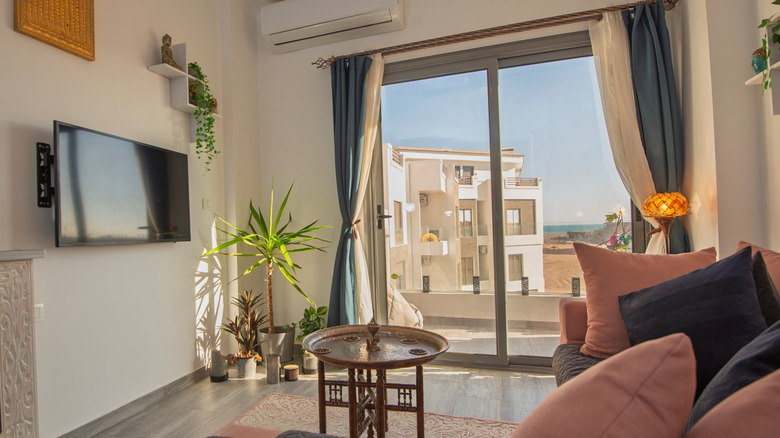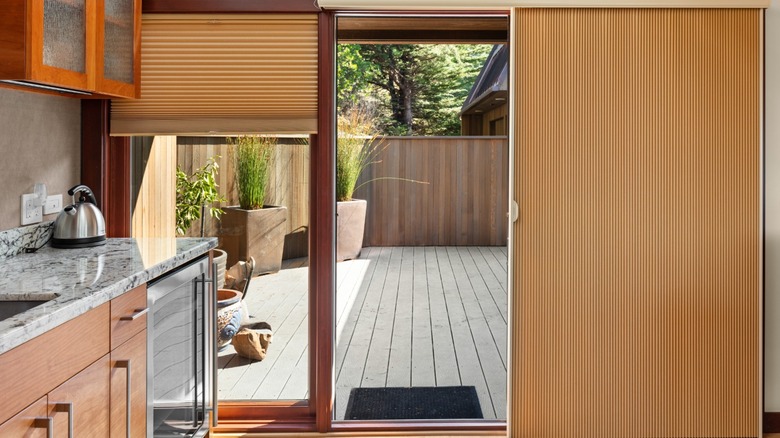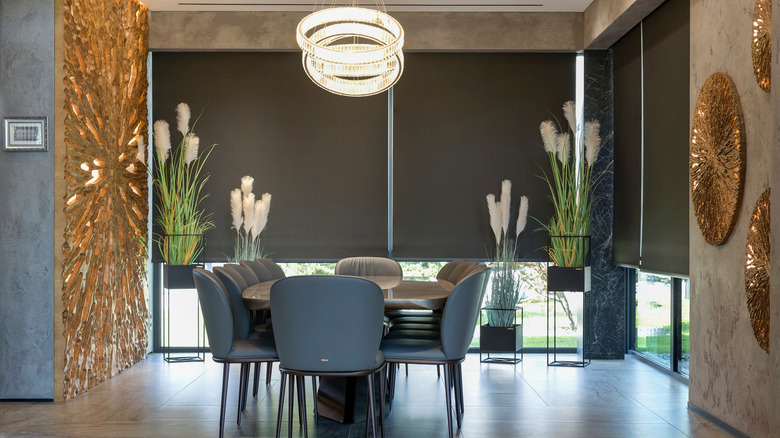The Best Type Of Curtains For Adding Privacy And Style To Sliding Glass Doors
Sliding glass doors can be an economical, space-saving, and aesthetically pleasing design choice that welcomes an abundance of natural light to a space while also seamlessly connecting your home's interior with the great outdoors. But for all their benefits, privacy can be an issue. There is a lot to consider when deciding on the best functional yet stylish option to cover your sliding glass doors and enhance privacy. For guidance, we turned to Steven Borodkin, Owner and Operator at Ultimate Shades and Shutters in Southampton, New York, for an exclusive interview. Borodkin brings his decades of experience to help every client find the window treatment that fits their way of life as well as their personal style.
When it comes to choosing the best option for your sliding glass doors, Borodkin said he most often recommends vertical treatments as a beautiful and effective solution to add privacy to sliding glass doors. Vertical options tend to be ideal for sliding doors since they follow their side-to-side movement. "Almost always, it will be some type of treatment with a stack to the side the door pulls to, meaning when you open the treatment, you clear the opening sufficiently (and aesthetically) for people to move comfortably in and out without damaging your new treatment, or it getting in their way," he explained. Still, horizontal options shouldn't be completely ruled out. "If you know what you're doing, and the situation presents itself, there are horizontal treatments," he said, "Meaning shading systems, be it roller blackout or solar, or cellular shade, both can work — manual or motorized."
Preliminary considerations for sliding glass door privacy treatments
The right sliding glass door window treatment can instantly make your room look bigger while providing the privacy you need, but Borodkin said his experience has taught him that there isn't a single privacy solution that will be right for every home. "Even though each sliding door itself is the same, it is the variation of the actual application as it applies to each home we visit. There are many variations that alter that final application," Borodkin said in his exclusive interview with House Digest.
According to Borodkin, one of the most important things to consider when choosing the right privacy treatment for your sliding glass doors is the space around the doors. He suggests measuring the space on either side of the doors and the wall space above, while also accounting for crown molding. You'll also need to consider the projection of the doors themselves. "Some sliders are flush [and] some sliders are recessed," he explained, "Make sure... [to] take a measurement of the projection off the wall so that the back of the treatment doesn't get stuck moving back and forth on handles, etc." When in doubt, Borodkin said it's a good idea to provide photos of the doors and surrounding space if you are working with a professional. "This will be important as to [have] a visual to match your measurements. Make sure to take any close-up photos of questionable areas you might want to remember to talk to your workroom or vendor about," he said.
Other sliding glass door privacy features to keep in mind
Speaking exclusively with House Digest, Borodkin emphasized that treatment privacy features like material thickness and level of light filtration are key. "The percentage is variable," he said. "Most [of the] time, 85% room darkening is achievable." He added that motorized treatments are more convenient than ever, saying, "Motorized drapery or verticals are extremely sustainable, and very affordable. Never having to handle the treatment on an active area always keeps the wear and tear down." Not only that, but external wiring is no longer required. "All systems have easily rechargeable systems... only needing charging twice a year," Borodkin said, adding, "Small solar patch chargers also are available for even more convenience."
While horizontal treatments aren't usually a great option for sliding glass doors, Borodkin mentioned that they leave the door totally unobstructed when retracted, which some homeowners prefer. Still, they can be tricky. "It's a question of headspace," he explained, "Meaning if the treatment rolls up or folds up, how much room is left to walk through the opening without having to bend down to avoid getting knocked [in] the head?" Plus, many horizontal treatment options retract into a fascia, which isn't always attractive. That's why it's so important to consider what treatment will be most practical — and most aesthetically pleasing — in your space. After all, the last thing you want is a sliding glass door window treatment that makes your home look cheap. According to Borodkin, it always pays to work with a professional to choose the best treatment for your home. "The only thing to avoid would be not asking for help if you feel you need it," he said.


